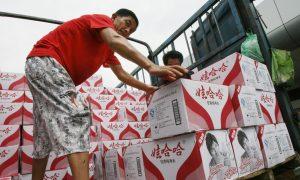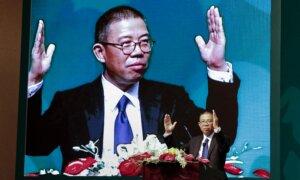Commentary
Not every Chinese knows the name Zhong Shanshan, but they all know his Nongfu Spring brand. This hugely successful bottled water has remained at the top of the Chinese market for eight consecutive years, quenching the thirst of millions. The brand’s most popular slogans include: “Nongfu Spring tastes a bit sweet,” and “We don’t produce water, we are just the porters of nature.”
Mr. Zhong is the founder of Nongfu Spring. After his company was listed on the Hong Kong Stock Exchange, its stock price skyrocketed, making it China’s largest beverage company with a market value exceeding $77 billion. In just a short span of time, Mr. Zhong became China’s richest person.
Mr. Zhong is also known for preferring solitude, jokingly referring to himself as a loner. The media describe him as a “lone wolf.” However, this reclusive figure, whose empire revolves around bottled water, could hardly have anticipated the sudden onslaught he would face.
Lone Wolf Attacked
On Feb. 25, news reverberated across China about the passing of Zong Qinghou, who founded the Wahaha Group. Headquartered in Hangzhou, Zhejiang Province, this conglomerate of companies is the largest beverage producer in China,
Mr. Zhong extended his condolences by sending a wreath and paying respects at the funeral home, mourning the loss of his “mentor and friend.” Yet, he notably refrained from attending Mr. Zong’s memorial service.
Unexpectedly, Mr. Zong’s demise plunged Mr. Zhong and Nongfu Spring into a maelstrom of public scrutiny. Various marketing channels and independent media outlets began dredging historical anecdotes about the two water giants, albeit with a clear bias. Many personal media platforms branded Mr. Zhong as “ungrateful” toward his former mentor.
The media described Mr. Zhong as a failed entrepreneur who found refuge under Mr. Zong’s wing. Later, he exploited the resources of the Wahaha Company to amass his initial fortune and establish Nongfu Spring as a competitor. This prompted calls for a boycott of Nongfu Spring.
Mr. Zhong’s criticism escalated unabated, calling into question his patriotism and alleged ties to Japan. The packaging design of Nongfu Spring’s products was criticized as flattering to Japan and humiliating to China.
Afterward, the Little Pinks disparaged how his son holds American citizenship. Claims circulated that by supporting Nongfu Spring, consumers were indirectly funding American interests. The orchestrated harassment of Mr. Zhong also raised suspicion of support from higher authorities.
On March 8, a 7-Eleven convenience store in Changzhou, Jiangsu Province, announced the cessation of all Nongfu Spring-related product sales, citing a refusal to endorse items perceived as promoting Japan or disparaging China.
Additionally, footage circulated of a supermarket owner returning a Nongfu Spring freezer, accompanied by bloggers’ live streams pouring Nongfu Spring mineral water down toilets and similar acts of protest.
The onslaught of verbal and written assaults dealt a significant blow to Nongfu Spring. During the first eight days of March, its stock price plummeted by 6.53 percent, resulting in a staggering $4.2 billion loss in market value. Daily sales volumes plummeted from $14,000-$35,000 to a mere $700-$1050, representing a decline of over 90 percent.
On the X platform (former Twitter), some bloggers expressed concerns that the online harassment directed at Nongfu Spring far transcends mere commercial rivalry. It is reminiscent of darker times in China’s history, evoking comparisons to the Cultural Revolution.
Lone Wolf Defends Himself
Amid the flurry of false accusations, the normally reticent Mr. Zhong chose to speak up on his behalf. On March 3, the Weibo account of Nongfu Spring released an article titled “Zhong Shanshan: A Few Words about My Relationship with Mr. Zong,” aiming to rebut the untruthful accusations against him.
Mr. Zhong began by saying: “Mr. Zong has always been an entrepreneur I respect. We were both mentors and friends to each other, albeit competitors as well. Upon learning of Mr. Zong’s serious illness some time ago, I immediately arranged for a visit through intermediaries. However, by that time, Mr. Zong was unable to take visitors, and I regretfully couldn’t visit. After Mr. Zong’s passing, I went to the funeral home to pay my respects, laid a wreath, and expressed sympathy to his family.”
Mr. Zhong then proceeded to lament the cyberbullying against him. He expressed disbelief at the surge of online attacks, asserting that such behavior contradicted Mr. Zong’s principles. Feeling compelled to address the matter, Mr. Zhong discussed several key events involving himself and Mr. Zong.
Mr. Zhong clarified that his initial business success was not based on earnings from Wahaha, but stemmed from a curtain company he established in 1990.
He recounted his initial encounter with Mr. Zong. Upon his suggestion, Mr. Zong invested in the development and production of Wahaha porridges. He also took Mr. Zong’s suggestion and set up Wahaha offices in Guangxi and Hainan to sell Wahaha Nutri-Express. However, despite his efforts, the products couldn’t sell well in the market. He ended up selling them to a trading company that might sell the products to Guangdong.
He addressed the dispute over natural water versus purified water post-2000, highlighting its resolution under the supervision of officials in Hangzhou.
He reiterated his belief in the significance of mineral elements in water for human health while showing unwavering admiration for Mr. Zong’s entrepreneurial drive.
Mr. Zong’s 95-year-old mother sadly passed away on March 11. In a post shared within his circle of friends, he linked her distress and death to the unjust online attacks against him, expressing deep sadness over her passing.
Water Quality Controversies
This recent incident appears to be a continuation of a previous one in 2013.
Between April 10 and May 7 that year, the Beijing Times published a total of 76 reports spanning 67 pages scrutinizing the water quality of Nongfu Spring. Allegations arose suggesting that the water was of lower quality than tap water and did not meet national standards.
In response, Nongfu Spring held a press conference on May 6 to refute these claims. The company stated that their adherence to the “Zhejiang Drinking Water Standard” already surpassed the “National Drinking Water Standard” mentioned in the reports. They also pointed out that the national standard for natural drinking water had not yet been established, implying that competitive interests may have influenced the Beijing Times’ coverage.
The standoff persisted, leading to Nongfu Spring’s decision to withdraw from the Beijing market and seek 60 million yuan in compensation from the Beijing Times. However, due to the closure of the Beijing Times in 2017, this compensation was never received.
Criticism of Mr. Zong began surfacing in 2009 when the Hainan Provincial Administration for Industry and Commerce released a test report questioning the quality of Nongfu Spring’s “Water Soluble C100” product. After debates, the product was eventually proven to meet the required standards.
Harvesting Private Enterprises Amidst the Specter of the CCP
During the 2022 Central Economic Work Conference, Xi Jinping expressed support for private enterprises and offered guidance to address their uncertainties. Despite these assurances, it was puzzling why China’s Central Propaganda and Cyberspace Administration departments allowed the cyberbullying and public humiliation of China’s wealthiest individual and most popular bottled water brand, resulting in a significant drop in sales.
Speculation arose suggesting that the attacks on Nongfu Spring, a private enterprise, may have been intended to benefit Wahaha, which is partially owned by a state-owned investment company.
While these rumors remain unverified, it is not surprising given the Chinese Communist Party’s need for funds and their targeting of private enterprises.
Additionally, Mr. Zong lacks political connections and comes from a family with a history of political dissent. He has publicly stated his aversion to flattery and socializing with influential individuals.
In Communist China, wealthy individuals without political ties are likely to encounter challenges. Despite facing hardships, Mr. Zong’s future and that of Nongfu Spring remain uncertain.
On March 11, as anticipated, Mr. Zong resigned as the legal representative of two Nongfu Spring subsidiaries. While the reason for his resignation is not confirmed to be related to the ongoing cyberbullying, Nongfu Spring has not provided an explanation, indicating that Mr. Zong’s struggles may be far from over.
Views expressed in this article represent the author’s opinions and may not align with those of The Epoch Times.
Source link







